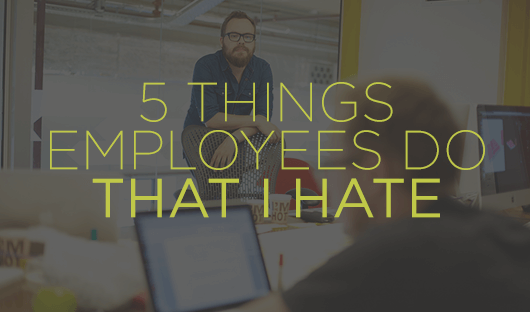5 things employees do that I hate
When you started your business it was just you. It was so simple. You were in control and it was easy to start making money (or, easy enough). But then you wanted to go on vacation. And you wanted to take on more work (so you could make more money), and so you hired some people. That seemed simple too: you hire people and they do work, right?

Wrong. Because people are people, not machines. People make mistakes. They want to be encouraged, appreciated, and rewarded. They need challenges, support and training. In short, they’re not simple. They are very complicated.
There goes simple—right out the window. That’s how I discovered the five things I really hate about having employees. Not all of these issues can be fixed, or even should be—some of them are tensions to be managed. But they are all things I hate.
1. I hate it when I come back to the office — unexpectedly — and all the lights are off.
Sure we have flexible hours. I know that they have their own lives. Deep down in my soul, I’m probably okay with it, because they probably got their work done and I know there have been lots of times they worked late…
But, when I come back and the lights are off, this idea bubbles up in the back of my mind: what else do I not know about what goes on when I’m not here?
2. I hate it when they’re waiting around for an assignment.
I try to pile up things in front of them, so there’s never a question. Maybe I’m not the most available boss. Sometimes I’m with clients, or at a speaking engagement, or I’m doing a podcast, or something like that, and they might run into some obstacles. Well, I want them to work on solving the problem, or overcoming the obstacles, or figuring out what the next step is, even if I’m not there.
I have to say—as somebody who considers himself proactive—I don’t understand the folks who don’t take initiative. Maybe I just have to make it crystal clear to them—I want them to take initiative—so they don’t have the idea that it’s better to do nothing, and wait for me to have a spare 30 minutes, than it is for them to be proactive and make a mistake.
3. I hate drama.
He said, she said…and then THIS happened. I don’t want to hear all that. I just want the problem fixed. That removes the drama. Stay focused on the goal. If you solve the problem, nobody cares about “he” and “she” and whatever happened between the two of them.
4. I hate it when they send me their problems.
I don’t need the “I was doing this, and then I tried this, and then this happened, and now I don’t know what to do.” I feel like they are saying, “It was my problem, and now it’s your problem.” No. It’s still your problem.
You can send me a thing that says, “here’s the help that I need from you to solve this problem”. You can send me something and says, “here’s 3 ways that I thought of to solve this problem”; but you can’t send me “here’s my problem,now you fix it”.
5. I hate mediocre performance.
Performance that’s just barely good enough or, worse, performance that’s great one day and terrible the next day…
Here’s the thing: if you’re a great employee, obviously I love you. I’m going to pay you, and we’re going to have a great time. If you suck as an employee, I’m going to fire you. It’s the people that almost perform up to standard, and they’rekind of getting the things done that make me nuts.
See, if they truly sucked, I would fire them. What I don’t like is that they’re just okay. When they’re mediocre, when they’re just okay, I’m constantly dissatisfied. I set expectations; and they almost achieve them. It’s never something that’s worth firing somebody over. But over a period of time, it builds up; and then it becomes “I can’t stand it anymore.”
Not knowing what I don’t know; feeling like if I can’t keep them busy they can’t keep busy; drama; making their problems MY problems; and mediocrity. That about covers it.
What are the things about having employees that drive YOU nuts?

Photo credit: Sebastiaan ter Burg
Download the script now
Here’s the script I use to go from that first performance conversation through “no drama” consequences all the way up to an eventual firing (if needed).
You can download it today and see it for yourself.